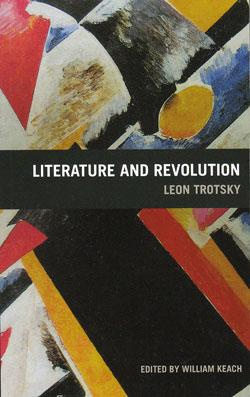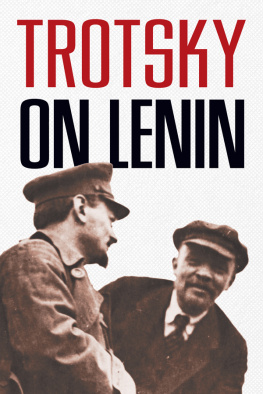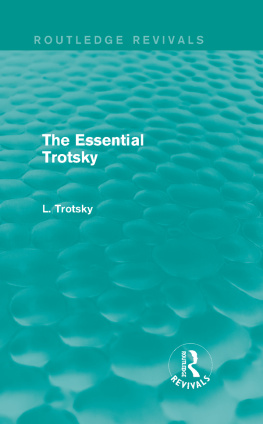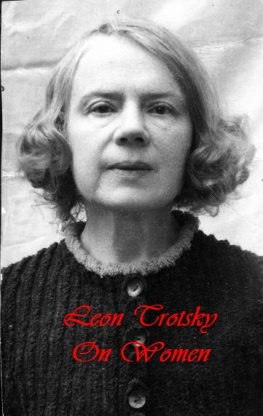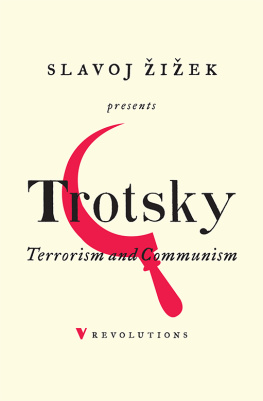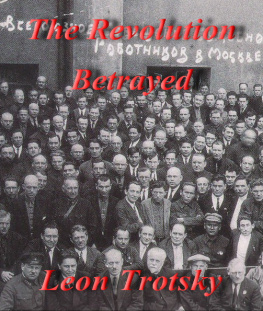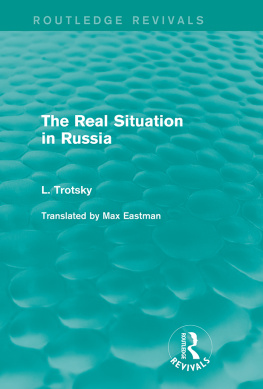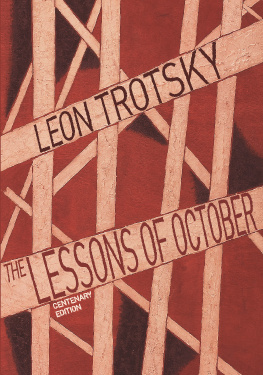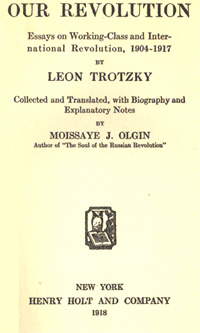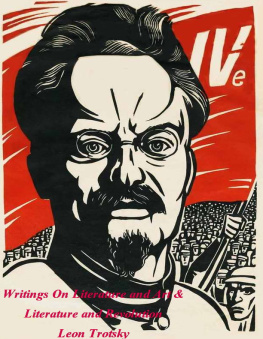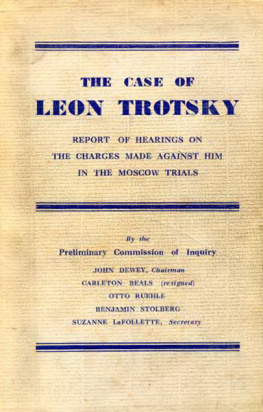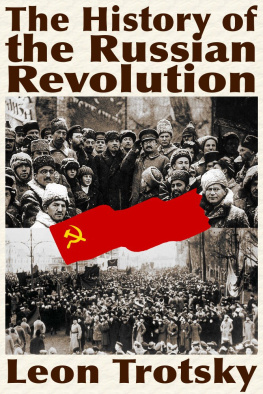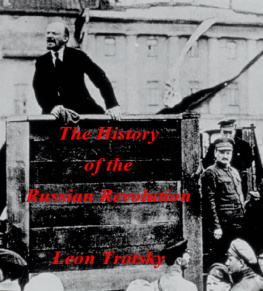Literature and Revolution
(1924)
Translated by Rose Strunsky in 1925.
Transcribed for the Leon Trotsky Internet Archive by N. Vaklovisky in June 2000 from an uncopyrighted 1957 Russell & Russell, New York edition of Literature and Revolution .
HTML markup by David Walters in August 2000.
Proofread and completed by Einde O'Callaghan in January 2007 using the 1991 RedWords (London) edition of Literature and Revolution .
Transcribed for Kindle by Joseph Mount.
Originally published by the Soviet Government in 1924 these essays by Trotsky constitute a significant contribution to then ongoing debate in the USSR over culture and art in a Workers State. It foreshadowed a later debate over the Stalinist conception of "Socialist Realism" in the later part of the decade. This book was suppressed by the bureaucracy after Trotsky was expelled from the Communist Party of the Soviet Union in 1928.
TO
CHRISTIAN GEORGIEVICH RAKOVSKY
WARRIOR, MAN, AND FRIEND,
I DEDICATE THIS BOOK
Table of Contents
The Intelligentsia Which Stood Aloof -
The Islanders - The Culture-Skimmers - The
Rallis - Reform in the Church - The Retainer - Quality in Literature - Individualism and Mysticism - Romanticism and AnthroposophyTransitional Art - A New Soviet Populism - Kliuev, A Revolutionary "Fellow Traveller" - Yessenin And The Imagists - The Unformed Realism of the "Serapion Fraternity" - The Retrogressional Realism of Pilnyak - Rustic or Peasant-Singing Poets - The "Changing Landmarks" Group - Neoclassicism or "Revolutionary Conservatism"Blok's Place in Russian Literature - The Pre-Revolutionary Element of Blok's Symbolism - Why
The Twelve is Not a Poem of the Revolution - Dualism - Blok and the BourgeoisieIts Bohemian Origin - The Break with the Past - The Component Elements of Russian Futurism - Mayakovsky and the Revolution - Futurism, a Line Between the Creative Intelligentsia and the PeopleThe Formalist Opposition to Marxism - The Reduction of Poetry to Etymology and Syntax - Art for Art's Sake and the Materialist Dialectics - The Argumentations of Shklovsky and Others - An Analogy with the Theologic Argument Against DarwinismWhat is Proletarian Culture, and Is it Possible? - The Cultural Methods of the Bourgeoisie and of the Proletariat - The Dictatorship of the Proletariat in Relation to Culture - What is Proletarian Science? - Workingmen-Poets and the Working-Class - Cosmism - Demyan BiednyRevolutionary Art not Produced by Workers Alone - Leisure and Political Indifference of True Intelligentsia as Factors in Creative Art - The Functions of the Communist Party in Relation to Art - Social Cataclysm and the Continuity of Art and CultureGreater Dynamics under Socialism - The "Realism" of Revolutionary Art - Soviet Comedy - Old and New Tragedy - Art, Technique and Nature - The Reshaping of Man
Introduction
The place of art can be determined by the following general argument.
If the victorious Russian proletariat had not created its own army, the Workers' State would have been dead long ago, and we would not be thinking now about economic problems, and much less about intellectual and cultural ones.
If the dictatorship of the proletariat should prove incapable, in the next few years, of organizing its economic life and of securing at least a living minimum of material comforts for its population, then the proletarian regime will inevitably turn to dust. The economic problem at present is the problem above all problems.
But even a successful solution of the elementary problems of food, clothing, shelter, and even of literacy, would in no way signify a complete victory of the new historic principle, that is, of Socialism. Only a movement of scientific thought on a national scale and the development of a new art would signify that the historic seed has not only grown into a plant, but has even flowered. In this sense, the development of art is the highest test of the vitality and significance of each epoch.
Culture feeds on the sap of economics, and a material surplus is necessary, so that culture may grow, develop and become subtle. Our bourgeoisie laid its hand on literature, and did this very quickly at the time when it was growing rich. The proletariat will be able to prepare the formation of a new, that is, a Socialist culture and literature, not by the laboratory method on the basis of our present-day poverty, want and illiteracy, but by large social, economic and cultural means. Art needs comfort, even abundance. Furnaces have to be hotter, wheels have to move faster, looms have to turn more quickly, schools have to work better.
Our old literature and "culture" were the expressions of the nobleman and the bureaucrat, and were based on the peasant. The nobleman who did not doubt himself as well as the "repentant nobleman" laid their imprints upon the most significant period of Russian literature. Later the intellectual-commoner arose, based on the peasant and bourgeois, and he, too, wrote his chapter into the history of Russian literature. After going through a period of fullest "simplification" [of leading the simple life of the people] the intellectual-commoner became modernized, differentiated and individualized, in the bourgeois sense of the term. Here lies the r6le of the Decadent and Symbolic schools. Already at the beginning of the century, but especially after 1907-1908, the rebirth of the bourgeois intelligentsia and its literature proceeds at full speed. The War made this process end patriotically.
The Revolution overthrew the bourgeoisie, and this decisive fact burst into literature. The literature which was formed around a bourgeois center, is no more. Everything more or less vital, which remained in the field of culture, and this is especially true of literature, tried, and still tries, to find a new orientation. In view of the fact that the bourgeoisie no longer exists, its center can be only the people, without the bourgeoisie. But who are the people? First of all, they are the peasantry, and to some extent the small burghers of the city, and after that those workers who cannot be separated from the protoplasm of peasant and folk. This is the basic approach of all the "fellow-travellers" of the Revolution. So thought the late Blok. Thus Pilnyak, the "Serapion Fraternity", the Imagists, who are still alive and doing well. Thus some of the Futurists (Khlebnikov, Kruchenikh and V. Kamensky). The peasant basis of our culture - or rather, of our lack of culture - reveals indirectly all its strength.
Our revolution is the expression of the peasant turned proletarian, who yet leans upon the peasant and lays out the path to be followed. Our art is the expression of the intellectual, who hesitates between the peasant and the proletarian and who is incapable organically of merging either with one or the other, but who gravitates more towards the peasant, because of his intermediary position, and because of his connections. He cannot become a peasant, but be can sing the peasant. At the same time, however, there can be no revolution without the leadership of the worker. That is the source of the fundamental contradiction at the very approach to the subject. One can say that the poets and writers of these sharply critical years differ from one another in the way they escape from this contradiction, and in the manner in which they fill in the gaps; one with mysticism, another with romanticism, a third with cautious aloofness, and a fourth with a cry which drowns everything. Regardless of the variety of methods of overcoming the contradiction, its essence remains one and the same. It consists in the separation created by bourgeois society of intellectual work, including art, from physical work, and it appears that the Revolution is the work of men doing physical work. One of the ultimate aims of the Revolution is to overcome completely the separation of these two kinds of activity. In this sense, as in all other senses, the problem of creating a new art proceeds entirely along the lines of the fundamental problem of constructing a Socialist culture.

